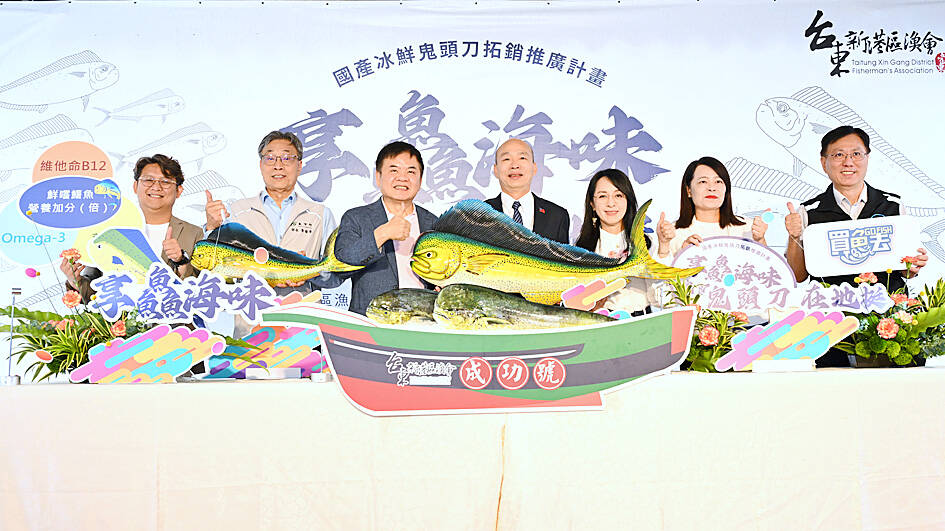Lawmakers yesterday called on the government to do more to help fishers respond to US tariffs, as 70 percent of Taiwan’s mahi mahi is exported to the US.
Speaking at a fisheries sale promotion event at the Legislative Yuan, Democratic Progressive Party (DPP) legislators Chuang Jui-hsiung (莊瑞雄) and Asenay Daliyalrep said that Taiwan’s catch of mahi mahi comprises 10 percent, or 3,000 tonnes, of the annual global catch, with 70 percent being sold to the US.
The fish is processed in Vietnam and Thailand, which are also subject to heavy tariffs by the US, making many fishers hesitant about whether they want to catch mahi mahi for export, Chuang said.

Photo: Chen Yi-kuan, Taipei Times
Chuang said that the Ministry of Agriculture should subsidize exports and expand markets, subsidize cold chain logistics and local added-value processing, and collaborate with domestic restaurants and shops to encourage domestic sales.
The Taiwanese fishery industry is not afraid of challenges or hardship, but is concerned that fishers’ efforts are not being met with equal pay, especially with US tariff policies, Legislative Speaker Han Kuo-yu (韓國瑜) said.
Han urged the ministry to support the industry, and called on Taiwanese to consume more mahi mahi.
US President Donald Trump on April 2 imposed a 32 percent tariff on imports from Taiwan, but one week later announced a 90-day pause on its implementation.
A universal 10 percent tariff was still applied on most imports to the US.
Minister of Agriculture Chen Junne-jih (陳駿季) said that the ministry would assist agriculture associations to obtain Marine Stewardship Council certification, also known as the blue fish label, to facilitate sales to the US and other countries.
In terms of domestic markets, the nation would promote sales of mahi mahi by encouraging sellers to use vacuum packaging and working with Fishery Associations to develop fish products.
Chuang said the ministry’s swift response to US tariff policies rendered the fishery agency timely aid and urged the government to implement more policies that would improve Taiwan’s cold logistics chain to boost export chains.

The Coast Guard Administration (CGA) yesterday said it had deployed patrol vessels to expel a China Coast Guard ship and a Chinese fishing boat near Pratas Island (Dongsha Island, 東沙群島) in the South China Sea. The China Coast Guard vessel was 28 nautical miles (52km) northeast of Pratas at 6:15am on Thursday, approaching the island’s restricted waters, which extend 24 nautical miles from its shoreline, the CGA’s Dongsha-Nansha Branch said in a statement. The Tainan, a 2,000-tonne cutter, was deployed by the CGA to shadow the Chinese ship, which left the area at 2:39pm on Friday, the statement said. At 6:31pm on Friday,

The Chinese People’s Liberation Army Navy’s (PLAN) third aircraft carrier, the Fujian, would pose a steep challenge to Taiwan’s ability to defend itself against a full-scale invasion, a defense expert said yesterday. Institute of National Defense and Security Research analyst Chieh Chung (揭仲) made the comment hours after the PLAN confirmed the carrier recently passed through the Taiwan Strait to conduct “scientific research tests and training missions” in the South China Sea. China has two carriers in operation — the Liaoning and the Shandong — with the Fujian undergoing sea trials. Although the PLAN needs time to train the Fujian’s air wing and

The American Institute in Taiwan (AIT) put Taiwan in danger, Ma Ying-jeou Foundation director Hsiao Hsu-tsen (蕭旭岑) said yesterday, hours after the de facto US embassy said that Beijing had misinterpreted World War II-era documents to isolate Taiwan. The AIT’s comments harmed the Republic of China’s (ROC) national interests and contradicted a part of the “six assurances” stipulating that the US would not change its official position on Taiwan’s sovereignty, Hsiao said. The “six assurances,” which were given by then-US president Ronald Reagan to Taiwan in 1982, say that Washington would not set a date for ending arm sales to Taiwan, consult

A Taiwanese academic yesterday said that Chinese Ambassador to Denmark Wang Xuefeng (王雪峰) disrespected Denmark and Japan when he earlier this year allegedly asked Japan’s embassy to make Taiwan’s representatives leave an event in Copenhagen. The Danish-language Berlingske on Sunday reported the incident in an article with the headline “The emperor’s birthday ended in drama in Copenhagen: More conflict may be on the way between Denmark and China.” It said that on Feb. 26, the Japanese embassy in Denmark held an event for Japanese Emperor Naruhito’s birthday, with about 200 guests in attendance, including representatives from Taiwan. After addressing the Japanese hosts, Wang